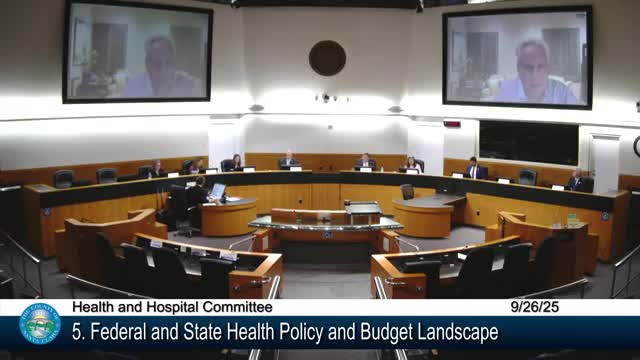County briefed on federal budget fight: Medicaid cuts and expired premium tax credits could raise premiums and reduce coverage
September 27, 2025 | Santa Clara County, California
This article was created by AI summarizing key points discussed. AI makes mistakes, so for full details and context, please refer to the video of the full meeting. Please report any errors so we can fix them. Report an error »

A policy consultant told the Santa Clara County Health and Hospital Committee that a government shutdown and provisions in a package dubbed HR 1 pose immediate and long‑term risks to local health services.
Bert Margolin (presenting for a contracted policy group) said two congressional fights are central: restoration of prospective Medicaid cuts in HR 1 and extension of the enhanced premium tax credits that make individual marketplace coverage—such as Covered California—more affordable. He said Democrats aim to use funding negotiations to force attention on both items, but that restoring Medicaid cuts was unlikely in the current political environment.
Margolin described the premium tax credits as the more plausible near‑term fix and said their expiration at year‑end would sharply increase exchange premiums nationwide. He cited analyses including the Kaiser Family Foundation and the Congressional Budget Office estimating steep premium increases and millions losing coverage if the enhanced credits are not extended. Locally, he said Santa Clara County could see increases in uninsured patients and greater pressure on county health services.
The consultant highlighted several other federal items of local interest: prospects for continued special payments related to disproportionate share hospital (DISH) funding (deferred payments had bipartisan support in recent congressional text), the scheduled expiration of telehealth flexibilities under Medicare (potentially affecting reimbursement for remote visits after Oct. 1), and uncertainty from recent federal vaccine‑policy actions that the county plans to monitor.
The committee asked about local responses; Margolin and staff said options such as parcel taxes or other local revenue measures have been considered elsewhere in California but face scheduling and legal limits. He noted that some hospitals in rural counties have already announced closures or operational challenges tied to the federal changes.
Bert Margolin (presenting for a contracted policy group) said two congressional fights are central: restoration of prospective Medicaid cuts in HR 1 and extension of the enhanced premium tax credits that make individual marketplace coverage—such as Covered California—more affordable. He said Democrats aim to use funding negotiations to force attention on both items, but that restoring Medicaid cuts was unlikely in the current political environment.
Margolin described the premium tax credits as the more plausible near‑term fix and said their expiration at year‑end would sharply increase exchange premiums nationwide. He cited analyses including the Kaiser Family Foundation and the Congressional Budget Office estimating steep premium increases and millions losing coverage if the enhanced credits are not extended. Locally, he said Santa Clara County could see increases in uninsured patients and greater pressure on county health services.
The consultant highlighted several other federal items of local interest: prospects for continued special payments related to disproportionate share hospital (DISH) funding (deferred payments had bipartisan support in recent congressional text), the scheduled expiration of telehealth flexibilities under Medicare (potentially affecting reimbursement for remote visits after Oct. 1), and uncertainty from recent federal vaccine‑policy actions that the county plans to monitor.
The committee asked about local responses; Margolin and staff said options such as parcel taxes or other local revenue measures have been considered elsewhere in California but face scheduling and legal limits. He noted that some hospitals in rural counties have already announced closures or operational challenges tied to the federal changes.
View full meeting
This article is based on a recent meeting—watch the full video and explore the complete transcript for deeper insights into the discussion.
View full meeting
